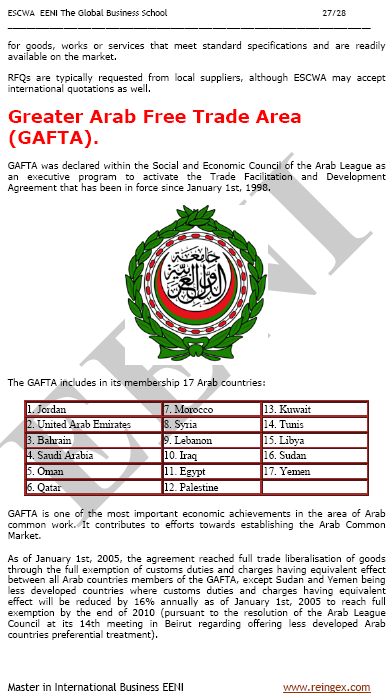Economic Commission for Western Asia ESCWA
Greater Arab Free Trade Area (Economic Social Commission for Western Asia)

The UN Economic and Social Commission for Western Asia (ESCWA) is a framework for sectoral policies conception and coordination in Western Asian economies.
- Introduction to the UN Economic and Social Commission for Western Asia (ESCWA)
- The Economic and Social Commission for Western Asia Commission and other intergovernmental bodies
- Social Development and the Economic and Social Commission for Western Asia
- Women Centre of the Economic and Social Commission for Western Asia
- Economic Development and Globalization in the Western Asian region
- Information and Communication Technology
- Statistics of the Economic Commission for Western Asia
- Investment in the Western Asia region
- Greater Arab Free Trade Area (GAFTA)

Religions and Global Business -
Religious diversity
The purposes of the subject “Economic Commission for Western Asia (ESCWA)” are:
- To understand the goals, structure, and functions of the Economic and Social Commission for Western Asia of the UN
- To analyze the economic and social development of the member countries of ESCWA
- To learn about the Greater Arab Free Trade Area (GAFTA)
- To evaluate the funds and projects of the Economic and Social Commission for Western Asia
Sample:
EENI delivers to HRH Prince Alwaleed bin Talal a Master Honoris Causa.

The Subject “Economic and Social Commission for Western Asia (ESCWA)” is included within the curriculum of the following academic programs at EENI Global Business School:
Master: Religions & International Business, International Business.

Doctorate: World Trade, Ethics, Religion & Business.

Languages:  or
or  Comisión Económica y Social Asia Occidental
Comisión Económica y Social Asia Occidental  Commission économique Asie Ouest.
Commission économique Asie Ouest.
- Subject Credits “Economic and Social Commission for Western Asia”: 1

Economic and Social Commission for Western Asia (ESCWA).
The UN Economic and Social Commission for Western Asia (ESCWA) is the regional body of the UN for Western Asia.
The member states of the Economic and Social Commission for Western Asia (ESCWA) are
Algeria, Bahrain, Egypt, Iraq, Jordan, Kuwait, Lebanon, Libya, Morocco, Mauritania, Oman, Palestine, Qatar, Saudi Arabia, Somalia, Sudan, Syria, Tunisia, the Emirates, and Yemen.
The production sectors in the region of the Economic and Social Commission for Western Asia suffer from low productivity and poor competitiveness, which can largely be attributed to the inefficient use of resources, insufficient creation of “networking” and misuse technology.
The small and medium-sized enterprises, which are among the main employment and income sources, are the most vulnerable groups to these challenges.
The Economic and Social Commission for Western Asia (ESCWA) cooperate with other regional bodies like the Arab League, the Organization of Islamic Cooperation or the Cooperation Council for the Arab States of the Gulf (لمجلس التعاون لدول الخليج العربية).
The Economic and Social Commission for Western Asia (ESCWA) belongs to Islamic Civilization and African Civilization.
(c) EENI Global Business School (1995-2025)
Top of this page










 WhatsApp
WhatsApp